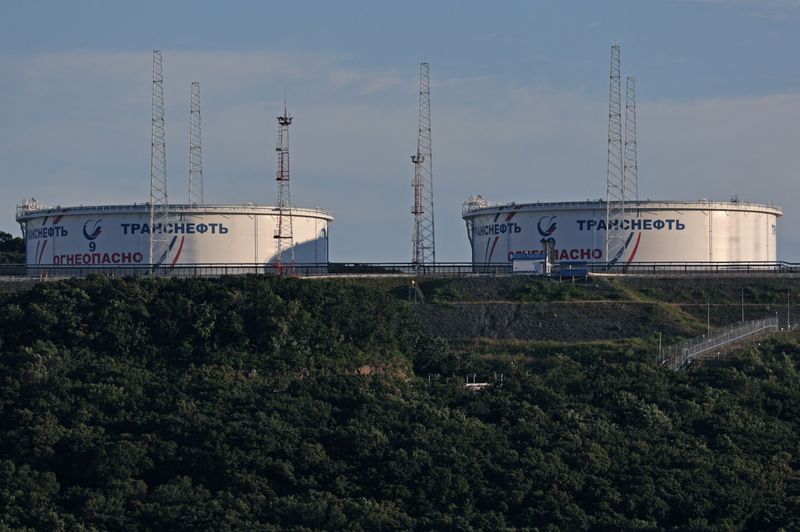
© Reuters. A view shows oil tanks of Transneft oil pipeline operator at the crude oil terminal Kozmino on the shore of Nakhodka Bay near the port city of Nakhodka, Russia August 12, 2022. REUTERS/Tatiana Meel/file photo
By Robert Harvey
LONDON (Reuters) -Oil prices rose on Tuesday as the Middle East crisis and a Libyan supply outage reduced the previous day’s heavy losses.
futures were up $1.07, or 1.41%, at $77.19 a barrel by 1515 GMT and U.S. West Texas Intermediate crude futures gained $1.12, or 1.58%, to $71.89.
At their intra-day peaks both benchmarks were up by more than $2 a barrel but prices have since cooled.
“On the supply side, there are some bullish factors from the closure of Libya’s largest oilfield, which has affected around 0.3 million barrels per day of oil production,” said Suvro Sarkar, energy sector team lead at DBS Bank.
In the Middle East, meanwhile, some major shipping companies are still avoiding the Red Sea after attacks by Iran-aligned Houthi militants in response to Israel’s war against Hamas.
Germany’s Hapag-Lloyd will continue to divert vessels around the Cape of Good Hope, it said on Tuesday.
The Israeli military has said its fight against Hamas will continue through 2024, worrying markets that the conflict could grow into a regional crisis that could disrupt Middle Eastern oil supplies.
U.S. Secretary of State Antony Blinken told Israeli leaders there was still a chance of winning acceptance from their Arab neighbours if they create a path to a viable Palestinian state.
Brent and incurred 3% and 4% losses respectively on Monday after sharp cuts to Saudi Arabia’s official selling prices (OSP), prompting both supply and demand concerns.
“The question is whether the Saudi move of reducing OSPs to a 27-month low is also a sign of a potential increase in oil supply, implying serious discord within OPEC+,” said PVM analyst Tamas Varga.
But Saudi Arabia on Tuesday emphasised its desire to support efforts aimed at stabilising oil markets.
Commerzbank (ETR:) analyst Carsten Fritsch added that the OSP cut “indicates a weakening of demand for oil in the three most important demand regions”.
German industrial production fell unexpectedly in November, according to the federal statistics office, marking a sixth consecutive monthly decline.
Investors are also awaiting U.S. inventory data from the American Petroleum Institute later on Tuesday.
Core U.S. inflation data on Thursday will also be in the spotlight.












